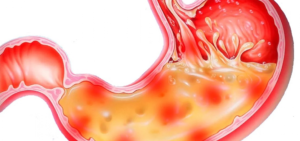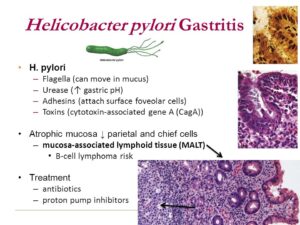Gastritis treatment
Gastritis treatment
Let’s talk today about gastritis treatment, and the belief that the ills of the soul and discomforts of the body manifest themselves in stomach burning has prevailed for centuries. What is new now is that stomach pains are also caused by a bacterium, H.pylori. The discovery has benefited millions of people, who were previously operated on for ulcers. But it hasn’t changed one fundamental concept: Everything that happens in the stomach has to do with what we eat and how we feel. The stomach remains the most precise and delicate thermometer of our body and soul.
It is like an “evil juice”, the result of a potion in which we put in the blender all the tensions and temptations of the day-to-day life, bad moods, resentments, and low spirits head the attitudes of eating fat and fried food, sodas and alcoholic drinks, and a smoke of cigarettes. The most common symptom is an upset, burning, burning stomach. It all starts with a sudden pain in the upper belly. You are not sure if it is the sandwich you ate in a hurry, if it is too much pepper, if it is the pile of bills to pay, or the presence of the boss you cannot tolerate.
This state of discomfort can last for a few days, pain, burning, a bad taste in the mouth. Canker sores appear, and you begin to suspect that you may be overworked both physically and mentally. It is time to take care of your health. It is your stomach that is telling you all this, and it is usually right.
Gastritis treatment- What is gastritis anyway?
Our stomach has a protective layer, called the mucosa. Its main function is to protect the stomach walls from the acidity of the gastric juice. Gastric juice is very acidic and is produced due to physical stimuli, such as chewing, and chemical stimuli, such as the sensation of hunger. Constant nervousness and tension also force the uninterrupted release of acid into the stomach.
Without acid food to digest, this release can cause a corrosion of the mucosal walls, which causes pain and discomfort. This can happen, for example, when we chew gum. The organism interprets that mechanical chewing as something that is being digested, so it releases hydrochloric acid, which in turn triggers the enzyme called pepsin, which is responsible for breaking down the protein in the food. As this food does not arrive, this acid will “eat away” at the stomach walls.
Gastritis, therefore, is an inflammation of the gastric mucosa. It is halfway to an ulcer. In gastritis, the destruction of the mucosa goes beyond its muscular layer and, when treated in time, the lesion usually heals completely. If the inflammation continues, it can eventually lead to the appearance of ulcers, which lead to eventual bleeding and can deteriorate the patient’s health.
Gastritis treatment – Introducing the symptoms
The most common symptoms of gastritis are
- Burning sensation in the stomach area, accompanied with or without nausea.
- Sharp pain; dyspepsia, which is the feeling of heaviness in the stomach after meals.
- Halitosis: bad breath, present in some cases
- Hematemesis: bloody vomit or dark stools can appear in the most severe cases.
The patient’s history is always very important to the doctor. However, endoscopy and microscopic examinations are necessary for final confirmation of the diagnosis of gastritis. Nowadays, gastric biopsy is routinely performed in the vast majority of endoscopy services to search for the presence of Helicobacter pylori.
Gastritis treatment – More or less erosive gastritis
Gastritis can be divided into erosive and also non-erosive. Within each of these types of inflammation, it can be acute or chronic. The term “erosive” means that it can cause shallow (aphthous-like) ulceration, which does not go beyond the muscle layer of the mucous membrane, but causes widespread damage and pain. Usually this type of gastritis occurs in patients in a more serious condition.
Acute gastritis is sudden and sometimes violent at first. Flares very often occur after eating certain foods to which the individual is sensitive. They either follow the practice of eating in a hurry, or eating when fatigued or emotionally out of control.
Gastritis treatment – What causes gastritis
The discomfort of gastritis can also result from overconsumption of alcohol, smoking, and heavily spiced foods. Or from contamination by ingestion of an infectious agent known as Helicobacter pylori. The discovery of the role of H. pylori revolutionized stomach ailments, as we will see below.
Chronic gastritis is more common in most people. Its cause is poorly understood and it often precedes the development of organic gastric lesions such as ulcers or cancer. Studies show that it can be caused by infection with H. pylori, which leads to an inflammatory response and weakening of the mucosal defense. Others indirectly link chronic gastritis to diseases such as tuberculosis and heart failure.
Gastritis treatment – Defining helicobacter pylori
H.pylori is a bacterium now considered the great discovery and the great relief of contemporary gastroenterology. It was discovered about 15 years ago by two Australian scientists, Robin Warren and Barry G. Marchall, and their discovery revolutionized the understanding of gastric ulcers (in the stomach) and duodenal ulcers (located in the first portion of the small intestine). Mental sufferings of whatever origin, family problems, love troubles, all manifested themselves with stomach pains and illnesses.
The relationship between the stomach and psychosomatic sufferings – those that originate in the mind – has not changed. What has changed is a bacterium that has been added to this disease trigger. H.Pylori has been considered one of the main causes of gastritis and most other stomach problems. The soil in which stomach diseases will sprout is fertilized by this bacterium, which proliferates when the body is stressed and out of balance.
Gastritis treatment – Gastritis is curable
Yes, most gastritis can be cured. Medical follow-up is fundamental, and psychological evaluation is also very important.
Below we will suggest a nutritional orientation showing which foods should be avoided and which are allowed during crises…But remember that this orientation does not replace the need for medical follow-up.
Prohibited Foods
- atty and fried foods
- Acid fruits: orange, lemon, pineapple, strawberry, acerola, kiwi.
- Spices; vinegar, pepper, English sauce, tomato paste, ketchup, mustard, pickles.
- Coconut, walnuts, almonds, cashew and Brazil nuts, and peanuts
- Sausages in general; Sausage, sausage, salami
- canned and pickled foods
- beans, coffee, chocolate, tea
- alcoholic and carbonated beverages
Permitted Foods
- Milk, white cheese, ricotta
- Lean meats
- Boiled egg
- Cooked vegetables
- White bread, cornstarch crackers, crackers
- Rice, noodles
- Potatoes, boiled manioc.
For more tips and information access our site


